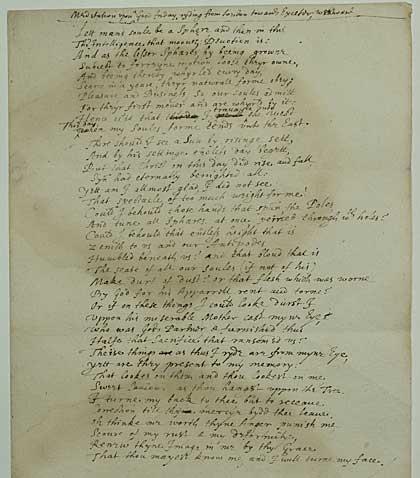
Bodleian acquires rare works by 17th century greats
Bodleian acquires rare works by 17th century greats Donne, Locke and Aubrey from Robert Pirie collection, returning national treasures to the UK.

A rare manuscript of one of John Donne’s most famous poems, a letter by influential philosopher John Locke and a John Aubrey book about the supernatural, liberally annotated by the Oxford scientist Robert Hooke, are among the treasures that the Bodleian Libraries has recently acquired from the collection of the late American bibliophile Robert Pirie. Pirie, who died in 2015, was one of the world’s leading book collectors and amassed perhaps the finest collection of 16th and 17th-century English literature in private hands. The Bodleian has purchased five books and manuscripts from the collection, bringing important works by leading English writers and thinkers back to the UK where they are now available for scholars to consult.
"Every one of these items has an Oxford connection and is a perfect complement to the Bodleian’s existing collections," said Chris Fletcher, Keeper of Special Collections at the Bodleian Libraries. "We are grateful to the institutions and donors who have helped us bring these books and manuscripts back to the UK for the benefit of the public and the scholarly community."
One of the five items purchased by the Bodleian is an early manuscript of John Donne’s poem Meditation upon a Good Friday, ryding from London towards Exceter, westward. This religious poem, written in 1613, was acquired with support from the National Heritage Memorial Fund. In the poem, Donne contemplates the fact that his thoughts are in the east, where Christ died, while he himself is riding west. This particular copy of Good Friday is written in the hand of Sir Nathaniel Rich, a colonial investor and politician, who was friends with Donne and probably made this copy in the 1620s. This copy has attracted interest from scholars since its discovery in the 1970s because it contains clues about the evolution of the text, for example it omits portions of the poem known from other manuscript versions and has Donne taking a different route on his journey westward.
This latest addition complements the Bodleian’s existing collection of Donne materials, which include the only surviving poem of Donne's written in his own handwriting. Interestingly, that copy is addressed to Sir Nathaniel Rich’s sisters. The Libraries also acquired a copy of a letter written by philosopher John Locke, through a secretary, to Irish physician Thomas Molyneux in 1699. The letter laments the recent death of his brother, William Molyneux, a natural philosopher who was Locke’s friend and is regarded as the founder of modern science in Ireland. During his lifetime, William Molyneux regularly corresponded with Locke and provided insights and criticism on Locke’s works.
This particular letter offers insights into the intellectual exchanges that took place between these two great thinkers. It also important because the paper stock on which it was written and the handwriting of the amanuensis may help with dating other works by Locke. The letter joins one of the largest collections of Locke materials in the world, which is held at the Bodleian.
A second letter acquired from the Pirie collection is one written by Archbishop William Laud to John Greaves, fellow of Merton College and Savilian Professor of Astronomy. Laud served as Chancellor of the University of Oxford from 1629 to 1641 and went onto become Archbishop of Canterbury from 1633 until he was executed for treason in 1645. The letter was written in 1642 from the Tower of London where Laud was imprisoned following his impeachment by Parliament in December 1640.
The letter has a strong association with the University of Oxford and, more specifically, the Bodleian’s long history of collecting and preserving items for future generations. Laud discusses the collection of coins he has given the University of Oxford, which were an addition to a large collection that he had given to the Bodleian in 1636. The letter asks that the gift be ‘written into the Booke’, a reference to a catalogue of the collection that still survives among the very extensive manuscript holdings that he bequeathed to the Library.
In addition to these three manuscripts, the Bodleian also purchased two books from the Pirie collection. The first is a copy of John Aubrey’s Miscellanies, which explores documented reports of a variety of unexplained supernatural phenomena, such as apparitions, omens, corpse-candles and knockings. Aubrey was an antiquarian and polymath who is best known for Brief Lives, his collection of short biographies of the leading figures of his day, the manuscript of which is held at the Bodleian Library. Despite spending much of his life engaged in research, this book, Miscellanies, was the only one Aubrey published in his lifetime. The copy acquired by the Bodleian was owned and extensively annotated by Robert Hooke, one of the leading scientists of 17th century England. Hooke’s copy appears to note down Aubrey’s own corrections and may well capture evidence of the two great men working on the text together.
The second book acquired is a small volume containing three separate works of proverbs bound into a single edition. It contains proverbs in Spanish, Finnish and English dating back as early as the 16th century, and include a wealth of sayings that remain part of the English language today including ‘the more the merrier’ and ‘Rome was not built in one day.’
The Bodleian purchased these items from the Pirie collection at auction in December 2015 and all items have now been catalogued and are available for consultation at the Bodleian Libraries. In addition to the National Heritage Memorial Fund (NHMF), the acquisitions were made possible thanks to the generous support of the Victoria & Albert Purchase Grant Fund, the Aurelius Trust, All Souls College, Oxford, Friends of the National Libraries, Friends of the Bodleian and several individual donors.
Notes to editors
The Bodleian Libraries at the University of Oxford is the largest university library system in the United Kingdom. It includes the principal University library – the Bodleian Library – which has been a legal deposit library for 400 years; as well as 30 libraries across Oxford including major research libraries and faculty, department and institute libraries. Together, the Libraries hold more than 12 million printed items, over 80,000 e-journals and outstanding special collections including rare books and manuscripts, classical papyri, maps, music, art and printed ephemera. Members of the public can explore the collections via the Bodleian’s online image portal at digital.bodleian.ox.ac.uk or by visiting the exhibition galleries in the Bodleian’s Weston Library. For more information, visit www.bodleian.ox.ac.uk.
Further information
Elaine Bible, PR & Communications Officer, Bodleian Libraries via email: elaine.bible@bodleian.ox.ac.uk or via: tel: 01865 277 627.

